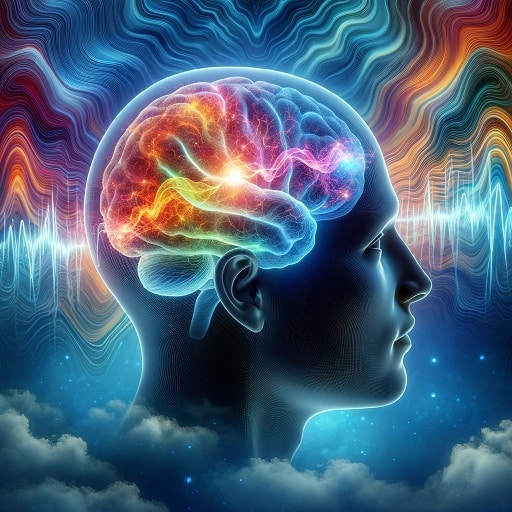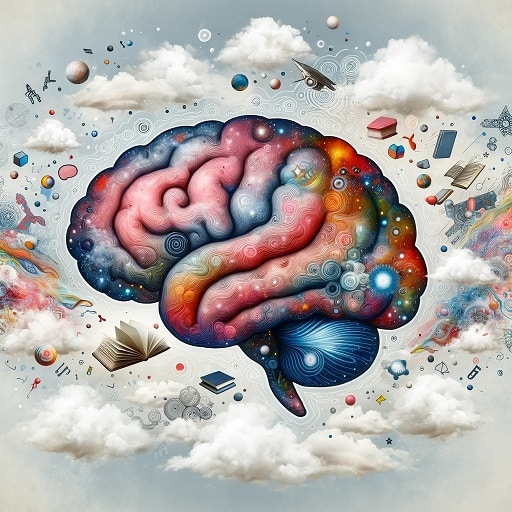Sleep, a seemingly simple act, is a complex and vital process that affects every facet of our lives. One of its intriguing stages is Rapid Eye Movement (REM) sleep, a phase that not only hosts our most vivid dreams but also plays a crucial role in our mental and physical health. But what happens when we don’t get enough of this critical sleep stage, particularly in REM sleep? What are the mysteries that in REM sleep holds, and why should we care about it?
Key Takeaways
- REM sleep is essential for quality sleep, cognitive performance and overall health.
- It helps consolidate memories and regulate emotions, as well as replenish the immune system.
- Sleep deprivation can have detrimental effects on REM sleep, leading to impairments in memory recall and emotional balance.
The Science of REM Sleep
Entering the phase of REM sleep, we come across a unique mix of tranquility and action, distinct from both the deep sleep stage and light sleep. This phase is characterized by rapid eye movements, hence the name, and high brain activity similar to wakefulness. Interestingly, during REM sleep, our body is nearly paralyzed, a state known as muscle atonia, which inhibits us from acting out our dreams. It is in this phase that we transition from falling asleep to a deeper level of rest, leaving behind the NREM sleep stages, including slow wave sleep.
Examining the science behind REM sleep more closely reveals the significant role this stage plays in the sleep-wake cycle. It usually begins about 90 minutes after we fall asleep and recurs about every 90 minutes, getting longer later in the night. This cycle, alternating between non-REM and REM sleep, is essential for quality sleep and overall health. The REM sleep phase, in particular, is crucial to this process.
It’s common to wake up during the REM phase. If you find yourself wondering why you often wake up at 3am, our article explores this phenomenon in the context of sleep cycles.
For a detailed understanding of the physiology of REM sleep, refer to the comprehensive overview provided by Joshua Feriante and John F. Araujo on StatPearls – NCBI Bookshelf.
Rapid Eye Movement

During REM sleep, the eyes move rapidly in various directions despite the closed lids, a phenomenon unique to this sleep stage. These eye movements are thought to coincide with specific dream events, as the eyes “follow” the dream’s action. The role of this activity is still a subject of ongoing research, but some theories suggest it might be related to dreaming and memory consolidation.
While REM sleep is known for vivid dreaming, sometimes these dreams can be unsettling. If nightmares disrupt your sleep, here are some tips on how to go back to sleep after a nightmare.
Brain Waves and Activity

When we fall into REM sleep, our brain activity increases significantly, resembling the brain waves during waking hours. This heightened activity is thought to be associated with the vivid dreaming that occurs during REM sleep. Interestingly, it’s during these periods of heightened brain activity that the most memorable and vivid dreams occur, further emphasizing the importance of REM sleep.
Explore further into the biology and evolutionary significance of REM sleep in the insightful articles available on NCBI, such as ‘The Biology of REM Sleep’ and ‘The Possible Functions of REM Sleep and Dreaming’.
Muscle Paralysis
An intriguing aspect of REM sleep is the occurrence of muscle paralysis. During this phase, nerve impulses are blocked, causing most of our muscles to become temporarily paralyzed. This is in contrast to non REM sleep, where muscle paralysis is not observed.
This phenomenon, known as REM atonia, is a protective measure that keeps us from acting out our dreams and potentially causing harm.
The Role of REM Sleep in Learning and Memory
Beyond its association with dreams, REM sleep also plays a substantial role in our cognitive functioning. It has a profound influence on learning and memory, playing an essential part in memory consolidation. This stage of sleep is when our brain processes and integrates the information we’ve learned throughout the day, transforming it from short-term to long-term memory.
Notably, REM sleep seems to favor certain types of memories. Studies have shown that this sleep stage is particularly beneficial for the consolidation of procedural, spatial, and emotional memories. Therefore, a lack of REM sleep might impair our ability to remember how to perform certain tasks, navigate our environment, or process our emotions.
Understanding how REM sleep aids in cognitive functioning, such as during reading, can provide deeper insights into our sleep patterns. For more on how certain activities like reading can induce sleepiness, explore our article on why reading can make you sleepy.
Memory Consolidation

In REM sleep, our brain busily consolidates and reinforces the day’s memories. It’s like a librarian sorting through a pile of books, categorizing them, and placing them on the right shelves. In this case, the “books” are the experiences and information we’ve gathered throughout the day, and the “shelves” are the long-term memory sections of our brain.
Procedural and Emotional Memory
When it comes to procedural and emotional memories, REM sleep takes center stage. Procedural memories, which are related to skills and tasks, seem to be particularly consolidated during this sleep stage. Moreover, REM sleep is suggested to play a role in the processing of emotional memories.
This means that it helps us remember not only what happened but also how we felt about it.
Cognitive Performance
Apart from memory consolidation, REM sleep also greatly influences our overall cognitive performance. During this sleep stage, our brain is actively engaged in processes such as learning, problem-solving, and decision-making. Therefore, a lack of REM sleep can lead to cognitive impairments, affecting our ability to think clearly, make decisions, and even regulate our emotions.
Health Benefits of REM Sleep
The benefits of REM sleep go well beyond dreaming and cognitive functions. This sleep stage plays a crucial role in our overall health, providing support for our immune system, helping regulate our mood, and contributing to brain development. Thus, ensuring that we get enough REM sleep is vital for our physical and mental wellbeing.
While we’re immersed in the world of dreams, our body is hard at work, reaping numerous health benefits. During REM sleep, our body replenishes its immune cells, helping us fight off infections. It also plays a role in mood regulation, helping us maintain emotional balance.
Moreover, REM sleep is particularly crucial for brain development, especially in infants, who spend a significant portion of their sleep in this stage.
Immune System Support

A healthy immune system is our body’s first line of defense against disease, and REM sleep plays a significant role in maintaining its strength. During this stage of sleep, our body replenishes its immune cells and reduces inflammation, helping us ward off infections. Thus, getting sufficient REM sleep can boost our immune function and contribute to our overall health.
Mood Regulation
REM sleep also plays a critical role in regulating our emotions. During this sleep stage, our brain processes and consolidates emotional memories, aiding in emotional balance.
Moreover, research suggests that REM sleep can enhance our responsiveness to emotional stimuli, thus playing a key role in our emotional health and wellbeing.
Brain Development
For brain development, REM sleep is particularly crucial. This stage of sleep is associated with the formation of synapses, or connections between nerve cells, particularly during early development. Moreover, REM sleep is believed to play a crucial role in memory consolidation and emotional processing, further emphasizing its importance in brain development.
Sleep Disorders and REM Sleep

Continuing our exploration, we must consider the potential interruptions to REM sleep caused by sleep disorders. Conditions such as obstructive sleep apnea, central sleep apnea, and REM sleep behavior disorder can significantly impact REM sleep quality, resulting in a host of health issues related to a specific sleep disorder.
Understanding these conditions and their implications can help us take proactive steps to address sleep disorders and improve REM sleep quality. Moreover, by recognizing the symptoms and causes of these conditions, we can seek appropriate treatment and prevent their potential impact on REM sleep and overall health.
Obstructive Sleep Apnea
Obstructive sleep apnea, characterized by recurrent episodes of partial or complete obstruction of the upper airway during sleep, is one such condition that can disrupt REM sleep. This condition can lead to frequent awakenings and fragmented sleep, potentially impacting the normal progression of sleep stages, including REM sleep.
Central Sleep Apnea
In contrast to obstructive sleep apnea, central sleep apnea is characterized by a lack of signals from the brain to the muscles that control breathing, resulting in interrupted breathing during sleep. This disorder can also disrupt the normal sleep cycle, leading to a reduction in REM sleep and overall sleep quality.
REM Sleep Behavior Disorder
Last but not least, REM sleep behavior disorder (RBD) is a condition characterized by:
- the lack of muscle paralysis that is typically experienced during REM sleep
- individuals physically acting out their dreams
- potentially causing harm and significantly disrupting REM sleep.
How to Improve REM Sleep Quality
Understanding the significance of REM sleep and the potential disruptions from sleep disorders, we can now look at ways to enhance REM sleep quality. From making adjustments to our sleep environment to maintaining a consistent sleep schedule and managing stress and anxiety, there are several strategies that can enhance our REM sleep quality.
Adopting these strategies allows our bodies to fully enjoy the numerous benefits of REM sleep. Not only will this lead to better sleep quality, but it can also improve our overall health and wellbeing.
Sleep Environment
Creating an optimal sleep environment can significantly enhance the quality of our sleep, including REM sleep. This includes ensuring that our bedroom is quiet, dark, and at a comfortable temperature. Moreover, having a comfortable mattress and pillow can also contribute to better sleep quality and improved REM sleep.
Alongside creating a calming bedroom environment, certain natural remedies like herbal teas can promote better REM sleep. Discover the best teas for a restful night in our detailed guide.
Sleep Schedule and Routine
Maintaining a consistent sleep schedule and routine is another effective strategy for enhancing REM sleep. By going to bed and waking up at the same time every day, we can help regulate our body’s internal clock, or circadian rhythm, and promote better sleep quality, including more REM sleep.
Managing Stress and Anxiety
Last but not least, managing stress and anxiety can significantly improve REM sleep quality. Techniques such as mindfulness meditation, deep breathing, and progressive muscle relaxation can help reduce stress levels and promote better sleep.
By managing stress and anxiety, we can create the best possible conditions for REM sleep, helping us wake up feeling refreshed and rejuvenated.
For couples, maintaining sleep hygiene can be a unique challenge. Learn effective strategies for couples to enhance REM sleep in our guide on sleep hygiene for couples.
The Effects of Sleep Deprivation on REM Sleep
Regrettably, sleep deprivation is quite common in our busy, non-stop society. While we may understand that missing out on sleep can leave us feeling tired and groggy, the effects of sleep deprivation extend far beyond these immediate symptoms. One of the most significant impacts of sleep deprivation is on REM sleep, which can have a host of negative consequences for our health and wellbeing. Some of these consequences include:
- Impaired cognitive function
- Increased risk of accidents and injuries
- Weakened immune system
- Mood disturbances
- Increased risk of chronic diseases such as obesity, diabetes, and heart disease
It is important to prioritize sleep and make efforts to improve sleep quality to avoid these negative effects.
From cognitive function and emotional balance to an increased risk of various health issues, the effects of sleep deprivation on REM sleep are far-reaching. By examining these effects, we gain more understanding of the need to prioritize sleep and ensure ample REM sleep.
Reduced Cognitive Function
Sleep deprivation can have a significant impact on cognitive function, affecting our ability to think clearly, make decisions, and even regulate our emotions. Lack of REM sleep can lead to cognitive impairments, including difficulties in memory recall, attention, and decision-making.
As such, ensuring we get enough REM sleep is crucial for maintaining optimal cognitive function.
Increased Risk of Health Issues
Beyond cognitive function, lack of REM sleep can increase the risk of various health issues. Studies have shown that a lack of REM sleep is linked to an elevated risk of cardiovascular disease, obesity, and diabetes.
By prioritizing REM sleep, we can help reduce the risk of these health issues and promote overall health and wellbeing.
Emotional Imbalance
Lastly, lack of REM sleep can lead to emotional imbalance. Research indicates that REM sleep deprivation can increase emotional reactivity and affect our ability to manage and process our emotions. Therefore, getting enough REM sleep is essential for maintaining emotional balance and overall mental health.
Conclusion
Through our exploration of REM sleep, we have learned about its significance for our health and wellbeing. From the unique eye movements and brain activity that characterize it to its role in learning and memory, mood regulation, and immune support, REM sleep is much more than just a stage of sleep.
In a sleep-deprived society, understanding and prioritizing REM sleep can make a significant difference in our health, cognitive function, and overall quality of life. Achieving deeper sleep, particularly during the REM stage, is essential for reaping these benefits.
Stay updated with the latest research and reviews on REM sleep through Nature’s dedicated section. This resource offers a wealth of studies and findings, delving into various aspects of REM sleep research.
Summary
In summary, REM sleep is a fascinating and crucial part of our sleep cycle. Its unique characteristics, from rapid eye movements to high brain activity, play an integral role in our overall health and wellbeing. By understanding the importance of REM sleep, recognizing the potential disruptions caused by sleep disorders, and adopting strategies to enhance REM sleep quality, we can ensure that we’re giving our body the rest it needs to function optimally.
Frequently Asked Questions
Is it good to be in REM sleep?
REM sleep is an important part of a healthy sleep cycle and provides benefits such as allowing us to process emotions, enabling dreaming, and aiding our mood, memories and learning. Therefore, it is good to be in REM sleep.
How much sleep time should be in REM?
Most adults should aim for about 90 minutes of REM sleep every night, which is approximately 25% of total sleep time.
What is the difference between REM and deep sleep?
Deep sleep and REM sleep are often confused, but they are distinct stages of sleep. Deep sleep is the third stage of sleep which occurs around 30-45 minutes after falling asleep and involves changes in the body, whereas REM sleep is characterized by rapid eye movements and associated with brain activity.
Do we wake up during REM sleep?
It appears that we spend increasing amounts of time in REM sleep as the night progresses, helping us to wake back up. Most people awaken after a normal night’s sleep in the morning at some point in a REM episode, suggesting that it is this stage which drives the sleeping brain to reach a threshold for awakening and consciousness.
What is the correlation between sleep deprivation and cognitive function?
Sleep deprivation has a significant negative effect on cognitive function, impacting our ability to think, make decisions, and regulate emotions.
